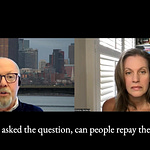Tom: Excellent. So what's our one today? We're talking about a four year college degree is required or necessary for your career in life. And I don't know what you've been reading, Christine. But this is a evolving conversation that is being driven by the business industry, by government agencies and organizations, and higher ed, because I think what we're, what we've learned coming out of COVID and the pandemic is that higher education needs to be pursued in different ways, and for many students, for many families, and for many jobs.
No, it is not necessary to have a four-year college degree.
Individuals need to look at their talents, their skills, their maturity level as they come out of high school to see where in fact they want to be in a year, five years, or ten years. And there are many professions that, with the right skills and the right motivation, you can enter right out of high school.
So the notion that we have a high population of students who are leaving high school, who are 25 and older who do not have a college degree sometimes meet barriers when they're trying to apply. So I'm in the state of Massachusetts, and the governor in Massachusetts is taking a very strong interest in this, and is now instructing hiring managers in the HR departments within the Massachusetts state government to be looking at positions that may not need college degrees.
Maybe they need an associate's degree or a certificate or credentials that you can learn, you can obtain online or through different types of learning environments. For those positions, because we have a lot of students, a lot of individuals who are not working because of that potential barrier.
Christine: So when I talk to students, and I'm glad you brought up your state that you're living in, because that's something for families to look at as well, because every state has in the U. S., our Constitution has awarded states control over education. So we don't have a U. S. higher education.
We, each state has their own individual ways of educating students. And depending on what state you're in, there's different options for that state. And some states in the West I'm thinking about the WUI in the West, they have reciprocal arrangements with other states. It's not as common in the east.
There are a couple. There's some in the south, but so it's important to know what does your state offer. For example, in Virginia, we have a program where students can go, they can spend their first two years at a community college. In Virginia, and then they're guaranteed admission with a certain GPA to any of the participating state public or private schools.
And it's really a tremendous program and I don't know that everybody knows about that so depending on which state you live in, you can recognize that I talked to students a lot about enlisted enrolled or employed, because the way I see it. Those are their three choices. And they're all great choices.
And a lot of times students won't do just one because if you're enlisted, you're also going to be employed, you're going to be drawing a salary and the US military is really great about taking in young enlistees and finding what they're really good at. And then putting them on a career path and training to utilize those skills.
I had a student, one of my very first years that I was doing this, I had a student who was very conflicted. He thought maybe he would start a lawn business after high school and then he thought he was going to do some acting and he was bouncing around, not knowing what to do.
And he joined the coast guard and he's just positively thriving right now. He's found out that he's actually really excited to learn how to fly. So there's things that were not options for him until the military introduced that to him. There's also employment. You could just do straight up employment, go out and work for, there's a lot of benefit to a gap year.
Tom: Yep, most definitely. All of those are very important. I wrote an article that I have on my blog that talks about the multiple ways in the state of Massachusetts you can go to school affordably and within your academic capability. And I think that's another thing that, I stress and we've talked about before academic and personal readiness.
Is an individual DNA. It's an individual's footprint, and we get so enamored with, prestige and elite and following what's going on in the neighborhood. What's going on in the school system that I think we miss. We missed the opportunity as parents to look at what's the best thing for our kids.
So yeah, you can go to a four year public or private institution in state or out of state if you're ready. You can go to community college. As you said, you can go into the military, I love that, enlisted, enrolled, employed, I might steal that from you. And it's important, and some individuals who want to go into the military need a little bit of a gap year of their own to get a little maturity under their belt.
My oldest son, third in the family he spent ten years in the Marine Corps, and one of his last assignments was as a Staff Sergeant in the Combat Instructors Program. And he saw the evolution of students or individuals coming into the military who weren't prepared, who needed a lot of extra love, so to speak, to get through boot camp, to get through training.
But yeah, once you get your MOS, as they call it, you can be doing all kinds of things. And you get out with 10 years or 20 years, and then you can do something else. And you mentioned gap year, and the gap year is important. I think we have to be less as a society. That was 80s coming out of various conflicts and troubles that everybody needs to go to college.
Everybody needs education after high school based on what they want to do, where they want to go.
Christine: That's it right there.
Tom: How we can, I love that enlisted, enrolled, or employed. I think that how we can continue to push that narrative.
Christine: Yeah, you used a word that we probably could do a whole segment on the word elite.
And it's a word that you and I have talked about before that neither of us care for, because the elite status is basically just colleges, getting more students to apply so that their acceptance rate will lower. And that as I think about that, there's a couple of books out there that I would recommend for parents and students to read who gets in and why where the author spent a year inside of college admissions, and he has this premise of colleges are either buyers or sellers and he breaks that down.
And I think that's really interesting. way to look at this word elite. I also like the book where you'll go is not who you'll be. So whether you do the military community college, a four year college I think that who you're going to be has a lot more to do with the flame that's inside the student, not necessarily, we know where they choose to spend that first year out of high school.
Tom: Yeah, definitely. The flame — I love that one too. The notion of how you develop yourself, at my age, I can reflect back on, how I've got to my point, but I look at my kids and the things they're doing, and even my grandchildren. We are a society that teaches and educates and provide mentoring along the way.
And there's no place more evident than in education and higher education and how we help students move forward. And I don't think that there's enough time taken by everybody. Because it's an everybody issue by everybody to try to help figure out where's the best place for my son and daughter to go to school or live after high school, they're young adult beginning of their adult stage.
Yeah, in Massachusetts, we have a similar program. You go to community college for two years. You can transfer, guaranteed transfer, if you have a certain GPA into one of the state schools or the universities. Or compete for a slot in one of the private schools, and the idea is, number one, you got to go in, you got to go in and be identified that way.
So you can be tracked that way. So there's a lot of little loopholes. There's a lot of little slippery slopes that can get individuals in trouble if they don't do it. I had a student who I met through the credit union. I'm a member of. He was ready to leave his community college program and go into a four year school to finish his four years degree.
And he wasn't classified the right way on the way in to the community college, so he wasn't eligible.
Christine: Oh,
Tom: no. So how do you resolve that? You call the president's office at the school and you'll get resolved. But we don't know that. We don't, as individuals, we don't know that. We have to help educate people and train them and expose them to different things along the way.
But yeah, there's a lot of different ways to get an education. It's very political, it's very government based, it's very emotional, and if we can break it down as families and students to, get past some of that I think it's important if, in your work and my work, I know when we're working with families and they're not seeing eye to eye with their students, we need to address that.
Because that's an important part of the process, setting goals and expectations, but no, you don't have to go and get a four year degree if you want to go into a particular line of work or you want to become an entrepreneur or self employed, I talked to kids that are coming out of high school.
I want to be a plumber or electrician. Okay. That's fine. You got to learn the trade. So you need to go through an apprenticeship program. You got to be prepared to carry a bucket of tools in it and get things when the boss wants you to. And that's no different than any other job that you might have in the world.
But you also need to learn how to become your own boss. So sometimes going to community college. Why you're starting a business or thinking about joining a business or in one of the trades helps you with that business side. An example that I always use is when I go to a networking event and I look around the room and we may have talked about this before and I look around the room and there's individuals standing on the peripheral.
Most of those individuals are probably coming from the trades because they're not used to coming into a group and connecting with people like we do in our offices. And sometimes they may be a little bit more of an introvert versus an extrovert. So I always gravitate towards that side of the room or that part of the room because I want to try to help bring someone into the middle, so everywhere along the line, we're looking for lifelong learning. I know in my job, I learn things every day when I have a new customer, I have a new question that comes in, whether it's got to do with going to college or dealing with education debt afterwards. So it's a process. And I would say is if you are getting out of high school and you don't necessarily want to go to college, make sure you develop a good network, go to networking events, go to activities where you can meet other people and you can find out what other people are doing.
Christine: Super important. So I just, I don't want to paraphrase and mess it up. Cause you said it so well before that the big takeaway here is no, you don't need the four year degree, but everybody learns after college. So do you remember that line? Can you say that again?
Tom: Everybody needs education after high school and depending upon what you're going to do or want to do, you follow that right path.
Yep. Yes. If I want to be in the medical world, And I want to be a doctor. Yes, you have to follow the education path to become a doctor or a nurse if I love selling things. If I sold Girl Scout cookies or deliver newspapers, if they still do that, and I want to continue to sell. You can go to a sales training program right out of high school, use your skills, and join a company to be part of the sales force.
Now, you have to also remember that when you're in an organization, maybe you meet a boss that isn't going to be the best boss because they're not really ready to coach or train someone, so you've got to be nimble and adapt. You want to sell insurance? Or learn how to be a financial planner? Yeah, you need a little education, but you can do that too.
I’m a firm believer that there are pathways for everybody: enlisted, enrolled, or employed.
I love that. All right. But you need to have certain readiness, academic, personal, and financial. And then you need to deal with all of the little idiosyncrasies to go through. You can't get out of high school and just get a job unless you have a good resume.
So you got to have a good writer. So you need someone like you to help them potentially write their resume or develop their resume. I'm not a career planner. So you need a career coach. I'm not a financial planner, so you need a financial planner, so you develop your team of individuals that are part of your life or your family's life, and they become your go to people as you move along, right?
You need a person. It's not a guy anymore, but you need a person to help you with all the different things as you move forward. So let's become more of a society that examines where the paths are. Follow them. Maybe you don't want to. Keep going. Okay. Military? Yeah. You join the military. You put your feet on the Marines.
You put your feet on the yellow footprints at boot camp. Yeah, you're there for your first four years. And then you can leave if you want. Okay. But we evolve in our jobs and we evolve in our lives. But yeah, you don't necessarily need that four year degree if that's not where you want to be.
Christine: Perfect way to wrap it up.
And I think that we should all aim to be lifelong learners. So even if you did get a four year degree, that doesn't mean you're done.
Tom: Yeah, most definitely. Most definitely. You get more credentials. You get a lot of OJT. If the audience doesn't know what that old fashioned phrase is or initials OJT, it's called on the job training.
And sometimes you can learn more on the job. Then you do in a book, but you combine the both you mentioned a couple of books. I will throw one out called 333 small schools, awesome schools is written by Peter pits. He's a former admissions individual in New Jersey. He focuses on small and medium sized schools, and that's another part of it when we're looking at selective and elite schools that are in the U. S. News and Report, and as you said, they drive their selectivity by having hundreds of thousands of people apply. He's focused on some small and medium sized schools, and yes, there's potential problems with that. Are they going to be open in four years? Are they going to survive, the enrollment bell curves and demographics that we go through?
But yeah, don't always Google top schools in engineering or science. Google small and medium sized schools and see what happens. As I say to students, do you want to be a small pebble in a big pond? Or do you want to be the big pebble in a small pond? And what you get in, what you take, what you do while you're in school is what's your takeout.
Ivy can be just the same as an unknown depending upon how much you're taking advantage of the resources as you move through the halls of school.
Christine: I also caution students and parents too to look at, what's the faculty student ratio? Because at some schools, Yeah, they may have a big name, but are you in front of tenured professors or PhDs?
Or are you in front of the grad students who are teaching a 500 student lecture hall? And that makes a big difference in what you're learning as opposed to, looking at these smaller and medium sized schools that you were talking about where, the faculty, the tenured faculty student ratio is one to eight.
Tom: Yeah, and students, they're coming out of high school, there's 000 students in the school, and they may not know everybody, but they want to go to a bigger school. Your point is very well taken. Yeah, I can go to a school with 60, 000 students, and unless there's a college within the college that you become a smaller nucleus your exposure to faculty, your exposure to student services, your exposure to academic support, unless you are a go getter, unless you are motivated to be your own advocate.
You'll be lost in those environments. So a student who isn't that, doesn't have that personality, and that's fine. I look at my four kids, each one of them are different. Very different. They all didn't become gabbers like me, okay? But each one of them is able to advocate for themselves because they've learned how to do that along the way.
Now they're, in their thirties. So if I'm a student, I'm a parent of a student who is relatively quiet and doesn't really do that a lot. And do we want them to be in a big fishbowl wondering what's going on, how to survive, or do we want them in a small school. So we need to look at that. We
Christine: do and I've heard you talk about this before.
What you're speaking of is like tailoring. The product that you're buying to the family and the individual who's going to be using it. So we do this when we buy a house. We do this when we buy a car. We do this when we buy a couch for our living room. Why do we not do this for our kids as colleges?
Tom: It's the wackiest thing.
I've been in this business for 35 plus years and it still hasn't changed. Parents and students don't approach higher ed in that consumer mindset, the consumer behavior that you have just mentioned. And then we allow social environment, something I've been reading a lot about, social environment to influence us along the way.
But yeah, we are the buyer, we're the buyer, our students are the commodity, and the school is the seller. So we want to be able to make that match work. But higher ed doesn't approach it that way. We're admissions, you apply, we'll evaluate, we'll look at your numbers, we'll tell you whether we want you or not.
And then you come and there's that we want you that coming to try to find your place that everybody gets so involved in the emotional side of it, the prestige to what's going on in the neighborhood, what's going on at the school system. What my parents and grandparents and relatives are asking.
Christmas can be the worst time when students haven't been notified that they've been accepted somewhere. I tell all of my students that I work with that first acceptance you get, you hang it on the refrigerator. And if anybody asks you what's going on and where are you going to go? You say, you have time to pick out the schools.
All right. But you have to get past some of that emotional side. Yeah, it's an individual purchasing process. In a huge global environment. So how do we expect individuals to do that without getting involved in the emotional side or the anxiety side? We do it by providing information like you and I are trying to do.
We trust individuals that we come in contact with that can provide fair information that aren't teasing people. They're not, Baiting people into here's a snippet of information. So you'll come work with them more. Yeah,
Christine: That's another huge takeaway from today. I'm going to college.
How great is that to empower students to have that line? I'm going to college because one of the things that I worry about is when students try to decide where they're going to college at the beginning of the process when there's not a single acceptance letter. Not
Tom: a single acceptance letter, no notion of what a big school or a small school is no notion about a distance.
Families who have freshmen and sophomores in high school, the thing that they should be doing is taking a ride. And as you're going on vacation or you're driving by a college, I think I've said it before to you, you just turn and say, Hey, Tommy, there's a college. That's what it's like in four or five years.
You drive through the campus. You have to expose students to things because who in their right mind thinks a 17 or 18 year old. Can make a decision that's going to last for four or five years when they supposedly become adults. All right, and they don't become adults until they become 30 to make these decisions along the way.
So no, we have to, we cannot expect students to make those kind of decisions while they're being pressured by everything else that's going on. And, we can talk about some of those pressures as we get past some of the myths, but there is a lot. So we have to break it down to an individual plan. An individual process that truly meets the student's academic and personal profile, family's financial capability to pay.
And then blend in all of the what I call blocking and tackling, writing a good essay with your support, writing good supplemental questions, answers to supplemental questions, being able to host a virtual conversation like this with someone from admissions and talk about yourself, how you do an intro how present yourself, how you go on to college tours.
It's all part of the process and families need time. Families need time. I have a program for scrambling seniors because in September, October, family will call and say, we're thinking about going to college, but what have you been doing for the last year? Nothing. We're going to scramble, but the more time you have, the more ability you have.
Christine: And I think, the big thing about putting that time in is consumers can change this dynamic instead of the college is deciding we're the elite, or we're going to make your admission decision for you. Consumers can push back and start making their own choices. And that's what you and I are trying to get them to do.
Tom: Yeah. I you hear the classic, you need reaches in your zone and safety, but what does that really mean? I talk about students looking at schools from a GPA and a testing and a course level a couple ticks above and a couple ticks below when they're looking for schools. But yeah, we have to foster a system where people are looking at things as a consumer.
They're asking detailed questions. You go to a small school with 2, 000 students. It's not unrealistic to ask the question, will you be open in four years? Now the admissions person that's on the other end of that receiving that question, unless they've heard it before, they're gonna, they're gonna have a look.
They're gonna have a body language tell that they probably don't know, and that's fine. Don't pressure the daylights out of them, but work with them to understand that my son and daughter might really love to come here. Your school has the offerings that's gonna meet their needs, but alone, I'm a little worried about what's going on.
And you've probably read, schools are now really taking a hard look at their budgets and taking a hard look at the courses. Probably the most important thing from that perspective is courses. What majors, what minors are undersubscribed? And are those programs going to be eliminated? I don't think that's a bad thing.
I think that it's gonna help higher ed from the standpoint of colleges becoming more specialized in their particular area. So if a school is really a good liberal arts school, Don't try to be something you're not, we talk about staying in our lane, what we know what we do, and we bring in other people to help.
So I think we're going to see a lot of colleges. Eliminating majors, eliminating programs, unfortunately, that's going to mean faculty they'll grandfather students in that are already in the school, but it's a really important aspect and you can do some easy Googling. You can do some easily internet searches to see what schools programs are what percentage of those programs of particular schools are so we got to be you may email that on the head, you got to be a good consumer.
Christine: Okay. I appreciate you meeting with me and taking the time. Our next myth that we're going to tackle next time is I'll never find my students right college. So I'm excited for that one.
Tom: That'll be a good one. And I think the one after that, in all fairness, is you're a great listener, but it's time for me to be the listener.
And I think we need to drop in there what it's all about when it comes to writing a good essay.
Christine: We're going to get there for sure. Definitely. Okay. All right. So I'll see you in a couple of weeks.
Tom: Thank you very much.
Christine: Okay











